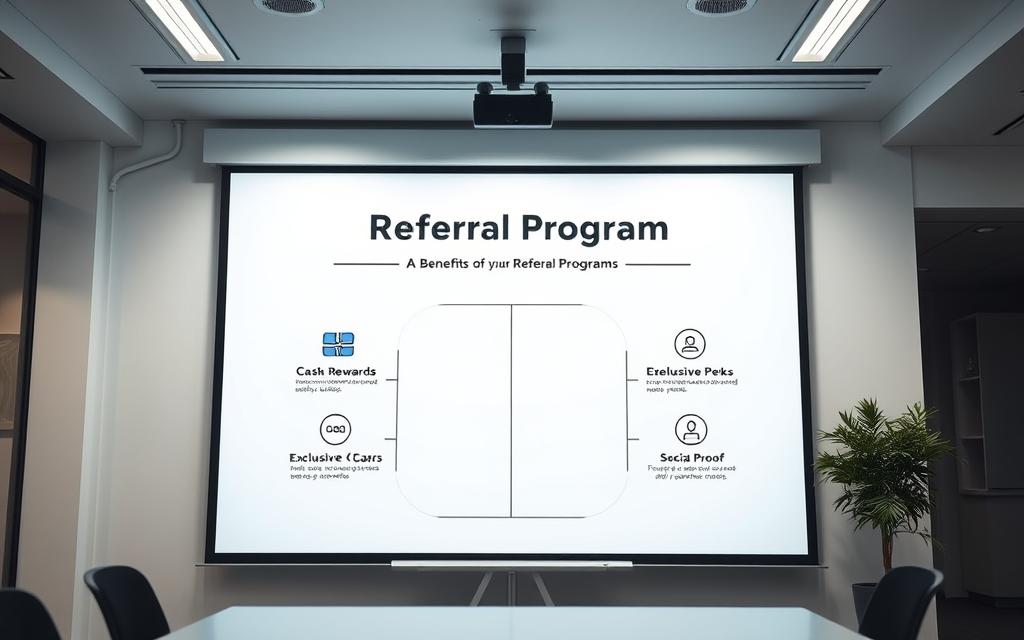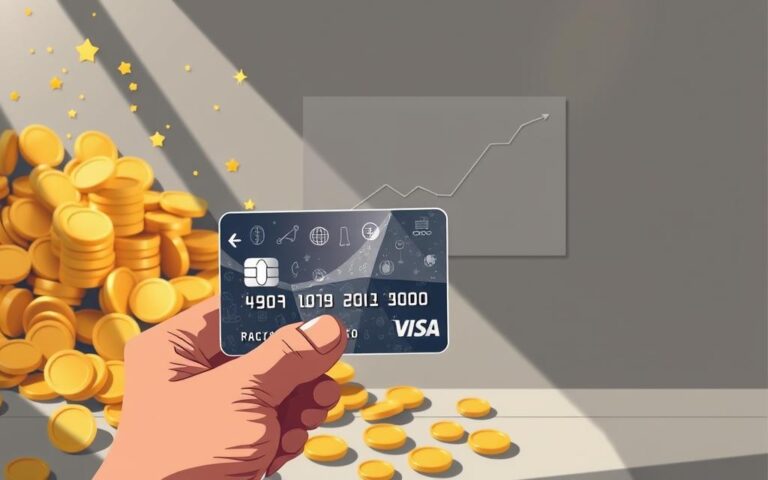Advertisement
Did you know that referral marketing is a top way to get new customers? It’s true, referrals have a 3-4 times higher conversion rate than other marketing. This is because people trust their friends and family more than ads.
Referral programs that give cash or gifts are very popular. They offer a real reward for sharing favorite products or services. In this article, we’ll look at some of the best programs that reward their customers.
Key Takeaways
- Referral marketing has a higher conversion rate than other channels.
- The best referral programs offer cash or gifts to their customers.
- These programs are an effective way to acquire new customers.
- Customers trust recommendations from friends and family.
- Referral programs provide a tangible incentive for sharing.
Understanding Referral Program Benefits
Referral programs are great for both businesses and customers. They help build loyalty and grow. It’s key to know how they work.
What is a Referral Program?
A referral program is a way for businesses to get new customers. They ask current customers to bring in new ones. It’s based on the idea that happy customers are the best way to find new ones.
Why Businesses Use Referral Programs
Businesses use referral programs as a cost-effective marketing strategy. They help get new customers. This method is more effective than ads because it uses the trust of current customers.
Key Benefits for Customers
Customers get tangible rewards for their referrals. This can be cash, discounts, or free services. These rewards not only save money but also make customers happier and more loyal.
| Program Aspect | Description | Benefits |
|---|---|---|
| Program Structure | Incentives for referrals | Increases customer engagement |
| Customer Incentives | Cash, discounts, or services | Enhances customer loyalty |
| Business Benefits | New customer acquisition | Cost-effective marketing |

Knowing the basics and benefits of referral programs helps businesses. They can use these programs to grow and keep customers loyal.
Cash vs. Gift Incentives
The debate on cash versus gift incentives in referral programs is ongoing. Each option has its own benefits. Businesses need to consider these to find the best strategy for keeping customers engaged and loyal.
Pros and Cons of Cash Rewards
Cash rewards are often seen as the most straightforward and appealing. They have a universal appeal and flexibility, letting customers spend the money as they wish. Yet, cash rewards might be viewed as less personal or less engaging than other incentives.
Some businesses see higher participation in their referral programs with cash rewards. This is because cash is simple and appealing. But, relying only on cash might not build brand loyalty as well as other rewards.
The Allure of Gift Incentives
Gift incentives offer a more personalized way to reward customers. They can match the brand’s identity and the customer’s interests, boosting loyalty and engagement. The emotional connection from a thoughtful gift can motivate customers to keep participating in referral programs.
But, gift incentives also have challenges. They can be more costly and might not appeal to everyone, reducing their effectiveness.
Choosing the Right Type of Reward
The choice between cash and gift incentives depends on the business’s goals and target audience. A successful referral program might use both types to meet different customer preferences.
Research shows that while cash is useful, gifts can make experiences more memorable and engaging. By understanding their audience and testing different incentives, businesses can make their referral programs more impactful.
Top Cash-Paying Referral Programs
Some of the most successful referral programs offer cash incentives. This is a win-win for both the referrer and the new customer. These programs boost customer loyalty and business growth through word-of-mouth marketing.
PayPal Referral Program
PayPal’s referral program is a great example of a cash-paying referral program. When you refer a friend to PayPal, you both get a cash bonus. This happens if your friend signs up and meets certain criteria. It’s a win-win situation.
How it works: You get $5 for every friend you refer who signs up and uses PayPal. There’s no limit to how much you can earn. This makes it a great option for those with a big network.
Robinhood Referral Program
Robinhood, a popular investment app, has a referral program that rewards users with cash. This program has helped Robinhood grow quickly.
Benefits: Both the referrer and the referee get a free stock worth up to $200. This happens when the new user funds their account with at least $1. It encourages referrals and helps new users start investing.
Dropbox Referral Program
Dropbox is known for its referral program, which has helped it grow its user base. While not just cash, Dropbox offers extra storage space for referrals. This can be seen as a reward.
“Referral programs are a powerful tool for growth. By incentivizing our users to refer friends, we’ve been able to significantly expand our user base.” – Dropbox Representative
Program Details: Users can earn up to 16 GB of free storage space by referring friends. For every friend who signs up, both the referrer and the referee get extra storage space. This can be up to a maximum of 16 GB per user.
| Referral Program | Reward Type | Reward Amount |
|---|---|---|
| PayPal | Cash | $5 per referral |
| Robinhood | Free Stock | Up to $200 |
| Dropbox | Storage Space | Up to 16 GB |
These examples show how cash-paying and reward-based referral programs can help businesses grow. By understanding these programs, businesses can create their own successful referral initiatives.
Popular Gift-Based Referral Programs
Companies are using gift-based referral programs to build a loyal customer base. These programs give various gifts to customers who bring in new clients. This boosts customer engagement and helps businesses grow.
Starbucks Rewards Program
The Starbucks Rewards Program is a great example of a successful gift-based referral program. Customers get stars for every purchase. When they refer friends, they earn bonus stars for free drinks and food.
This program not only encourages referrals but also gets customers to come back more often.
Airbnb Host Referral Program
Airbnb’s Host Referral Program rewards hosts for bringing in new hosts. Successful referrals get travel credits for future stays. This program has helped Airbnb grow its host community, offering more listings.
Uber Referral Program
The Uber Referral Program gives ride credits to both the referrer and the new user. It’s designed to get users to invite friends to try Uber. This expands Uber’s user base.
The program is simple and offers an immediate reward, making it very effective.
These gift-based referral programs show how businesses can encourage customers to become brand ambassadors. By offering appealing gifts, companies can build loyalty and grow.
Creating a Successful Referral Program
A well-crafted referral program is key for businesses wanting to use word-of-mouth marketing. By understanding the referral marketing benefits and creating a program that speaks to your audience, you can greatly increase customer engagement and acquisition.
Tips for Setting Up Your Program
To set up a successful referral program, follow these steps:
- Define clear objectives and incentives that match your business goals.
- Make it easy for customers to refer others by providing simple sharing options.
- Ensure your program is accessible and visible on your website and mobile app.
By following these strategies, you can create a customer referral program that works well.
Marketing Your Referral Program
Effective marketing is key to your referral program’s success. Here are some ways to promote it:
- Use email marketing campaigns to tell existing customers about your referral program.
- Leverage social media platforms to reach more people.
- Consider running limited-time promotions to encourage referrals.
By creatively marketing your referral program, you can make the most of it and enjoy the customer referral program advantages.
Measuring Success
To see how well your referral program is doing, track important metrics. These might include:
- The number of referrals generated.
- Conversion rates of referred customers.
- The overall return on investment (ROI) of the program.
By regularly checking these metrics, you can improve your program and meet your business goals.
Referral Programs for Small Businesses
Starting a referral program can change the game for small businesses. It’s a smart way to get new customers without spending a lot. It also rewards loyal customers for their support.
Advantages for Small Enterprises
Referral programs are great for small businesses. They help build a loyal customer base. The benefits of referral programs include more brand awareness, better customer retention, and a higher ROI than traditional marketing.
These programs also create a sense of community. Customers love to share their good experiences. This word-of-mouth marketing is priceless for small businesses, boosting credibility and trust.
Efficient Strategies for Referral Programs
Small businesses need cost-effective strategies for their referral programs. Offering meaningful rewards, like discounts or exclusive services, is better than expensive cash incentives.
Make the referral process simple. Use easy-to-use online platforms or mobile apps to track referrals automatically. This makes it easy for customers to refer friends and family.
Successful Referral Programs in Action
Many small businesses have grown thanks to referral programs. For example, a local coffee shop might give a free drink for every friend referred. A boutique clothing store could offer a discount on the next purchase for successful referrals.
| Business Type | Referral Incentive | Result |
|---|---|---|
| Coffee Shop | Free Drink | 25% Increase in Customer Base |
| Boutique Clothing | 10% Discount | 30% Rise in Sales |
| Fitness Center | Free Membership Month | 40% Growth in Membership |
These examples show how referral programs can help small businesses grow. It’s key to pick the right incentives and make the process easy for customers.
The Role of Technology in Referral Programs
Technology is key in today’s referral programs, making them better and more engaging. It helps businesses make their referral processes smoother. This makes it simpler for customers to join in and for companies to see how it’s going.
Using Apps and Platforms
Apps and platforms are big helpers in referral programs. They give users a smooth experience. They can share links, see how they’re doing, and get rewards easily.
For example, ReferralCandy and Ambassador offer great solutions. They have customizable links, track everything automatically, and give detailed reports.
Tracking Referrals Automatically
Automatic tracking is a big plus of using tech in referral programs. It lets businesses quickly spot and reward successful referrals. This makes customers happier and more likely to share again.
Tools like ReferralHero make tracking easy. They cut down on work for businesses and reduce mistakes.
Enhancing User Experience Online
Technology also makes referral programs better for users. It creates easy-to-use interfaces. This means customers can find their way around easily.
Businesses can make their websites work well on phones and make signing up simple. Clear instructions help too. A good user experience can really help a referral program succeed.
In short, technology is essential for today’s referral programs. It offers many benefits like easier processes, automatic tracking, and better user experiences. With the right tech, businesses can make their referral programs more successful.
Legal Considerations for Referral Programs
To make a referral program work well, it’s key to know the legal side. These programs help get and keep customers, but they must follow the law. This avoids legal trouble.
Understanding FTC Guidelines
The Federal Trade Commission (FTC) has rules for fair and open referral programs. Businesses must tell participants clearly about the program’s terms. This means being upfront about what rewards are offered and what’s needed to get them.
Key FTC requirements include:
- Clear disclosure of referral program terms
- Truthful advertising of rewards
- Compliance with privacy laws when collecting and using customer data
Tax Implications for Cash Rewards
Referral programs with cash rewards face tax issues. The IRS says cash rewards are taxable income. This means both the business and participants must report them.
Businesses should:
- Tell participants about the tax side of cash rewards
- Give the right tax papers, like a 1099-MISC form for rewards over $600 a year
Protecting Customer Privacy
Referral programs need to collect and use customer data. This must follow privacy laws like GDPR and CCPA.
Best practices for protecting customer privacy include:
- Get clear consent for data use
- Be open about how data will be used
- Keep customer data safe
By following these legal tips, businesses can make referral programs that work well and are legal. This helps protect both the business and its customers.
Common Pitfalls to Avoid
To make your referral program a success, it’s key to know the common mistakes. A good referral program can help get more customers and keep them loyal. But, some mistakes can make it less effective.
Miscommunication of Terms
One big mistake is not clearly explaining the program’s terms and conditions. It’s important to clearly state the rewards, how to join, and any rules. If you don’t, customers might get upset and lose trust.
For example, if the rules are unclear, people might refer friends who can’t get the rewards. This can lead to disappointment. To avoid this, use simple language and make the rules easy to find on your website or app.
Neglecting Existing Customers
Another mistake is ignoring your current customers. Getting new customers is important, but so is keeping the ones you have. Your referral program should reward both the person who refers and the new customer. This builds a sense of community and appreciation.
Think about a way to thank and reward loyal customers. This not only makes them happier but also encourages them to refer more friends.
Overcomplicating the Process
Making the referral process too hard is a big turn-off. If it’s too complicated or takes too long, people won’t bother. Make it simple by reducing steps and making it easy to find.
For example, a simple “refer-a-friend” link on your website or app can make things easier. Also, automating tracking and rewards can reduce mistakes and make things better for users.
Comparison of Referral Program Features
| Feature | Simple Referral Program | Complex Referral Program |
|---|---|---|
| Ease of Use | Easy to understand and participate | Multiple steps, confusing terms |
| Customer Engagement | High engagement, rewards both referrer and new customer | Low engagement, rewards only referrer |
| Tracking and Rewards | Automated tracking, timely rewards | Manual tracking, delayed rewards |
By avoiding these common mistakes, businesses can make effective referral programs. These programs can attract new customers and keep the ones you have, helping your business grow and build loyalty.
Future Trends in Referral Programs
The world of referral programs is changing fast. This is thanks to new ways people shop and tech advancements. As companies use referral programs to get new customers, some big trends are showing up.
Personalized Incentives
Now, businesses are making their referral offers more personal. They’re customizing rewards to fit what each customer likes. This makes the experience better and helps referral programs work even better.
Influencer Marketing Integration
Social media influencers are becoming a big deal. Companies are teaming up with them to reach more people. This not only promotes products but also builds loyalty, showing the power of good referral programs.
Sustainability and Ethics
More people care about the planet and doing the right thing. Referral programs that focus on being green or helping others are getting popular. By matching their programs with these values, companies can attract customers who care about the environment, boosting their image.



